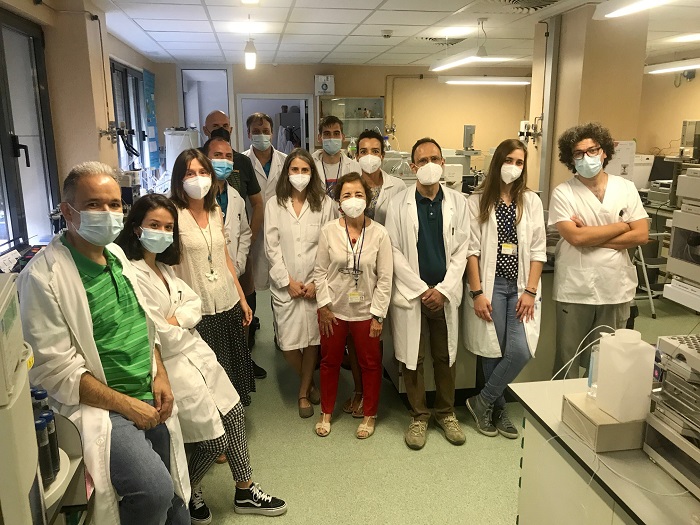Dr. Raquel Iglesias manages a research group of about 20 members, and she is particularly proud to see how her joint work evolves. And it is no wonder, for this is no small feat.
Since March 2019, she is Head of the Advanced Biofuels and Bioproducts Unit of CIEMAT, which depends on the Ministerio de Ciencia e Innovación (Ministry for Science and Innovation) . This group works on obtaining biofuels like ethanol, biogas, and biomethane as alternatives to natural gas, besides from bioproducts like lactic acid as a base molecule to produce bioplastics, that contribute to a more sustainable bioeconomy.
Raquel Iglesias has a PhD in Agronomy from Universidad Politécnica de Madrid (UPM). Before working at CIEMAT, she worked at CEH-CEDEX, first as Head of Water Technology Projects and later as Program Director for the multipurpose reutilization of urban wastewater planning and treatment.
“We started this research line on biogas-biomethane two years ago to recover agricultural waste, urban waste, sewage sludge, or dedicated biomass. We believe that the project will have a promising development, thanks to the high demand for projects related to biogas as an energy carrier. We want to undertake projects that integrate biogas resulting from waste treatment into hybrid energy systems with other renewable energy sources”, explains Iglesias.
The roadmap for biogas power published by MITECO last July 15, 2021, has distinctively defined objectives, akin to this group’s, that require using methane as a fuel for heavy vehicles and substitute fossil gas, apart from strengthening the circular economy and affix rural populations.

“We are after generating methane by biologically upgrading to renewable hydrogen or bringing new ideas to use biogas as a platform to obtain bioproducts”, explains Iglesias. “Currently, all technology to obtain alternative fuel sources to oil is welcome, in order to achieve the goals set by the EU to mitigate the effects of climate change”, affirms the researcher.
Raquel Iglesias intends to help integrate biomethane as an energy source in local systems. “In my opinion, the energy model requires generating power where it is needed as much as possible, helping industry growth and creating new value chains”, she comments.
Sewage treatment plants turned biorefineries
Iglesias explains that her team is an example in the characterization and pre-treatment of lignocellulosic biomass for its transformation into bioproducts through enzymes and fermentation. For instance, she offers, they are working on a project to transform wet wipes that reach the sewage treatment plants into ethanol to use as a biofuel.
Sewage treatment plants are going to become something more than facilities to treat wastewater to dump back into its medium or to reuse in agriculture, they will become biorefineries to obtain energy, nutrients, and other bioproducts with added value”.

Assuredly, Iglesias is partial to and is motivated by the concept of the circular bioeconomy. “To work in the circular economy, give waste products a second life and try to extend their lifecycle as much as possible … not only are these a riveting challenge, they are a necessity there no turning back from”.
Use of evolutionary engineering
Another extraordinary project of the Advanced Biofuels and Bioproducts Unit consists of increasing the performance of microorganisms, like fungi or bacteria, that transform biomass into bioproducts through evolutionary engineering processes.
“Our work is sugar-based. That is, we extract sugar from biomass, and microorganisms transform this sugar into the desired bioproducts. We are good at this sugar extraction process and preparing the microorganisms to work in these sugar-rich culture mediums. Biotechnological processes are becoming more and more efficient due to us being able to adapt these microorganisms and genetically modify them to use these sugars under certain conditions”, explains Raquel.
In her previous position, Raquel worked on risk management plans for wastewater use.
“Whenever you use wastewater with pathogens and harmful substances, you need to treat it and manage it to avoid environmental and health problems. European law on wastewater use in agriculture requires mandatory risk management plans. For years, I worked on recycled water use, both on treatment and regulation development, and I am still connected to these topics by collaborating with document revision or petitions from MITECO or EU projects”, comments doctor Iglesias.
An advocate for public research
Raquel Iglesias feels like her job in the public research system is demanding and challenging but she considers that getting results to improve the environment and thus, people’s quality of life by working for the common good is definitely worthwhile. “Elaborating data and participating in developing a regulatory framework so that everyone can keep functioning while respecting the environment is very satisfying”, she confesses.
Iglesias has worked mainly on the implementation and development of a framework for wastewater purification and reuse, both nationally and internationally, and on the assessment of treatment technologies for MITECO, two activities that she manages to combine in her current job at developing sewage treatment plants as biorefineries.
She remains connected to organizations related to wastewater treatment, energy efficiency and reuse like AEAS, and biogas related, like AEBIG. Furthermore, she also collaborates in plans and strategies to implement the circular economy, such as the Andalusian Circular Bioeconomy strategy, and she is highly active in platforms related to biomass use, like BIOPLAT, or bioethanol use, like Bio-e or APPA biofuels.
